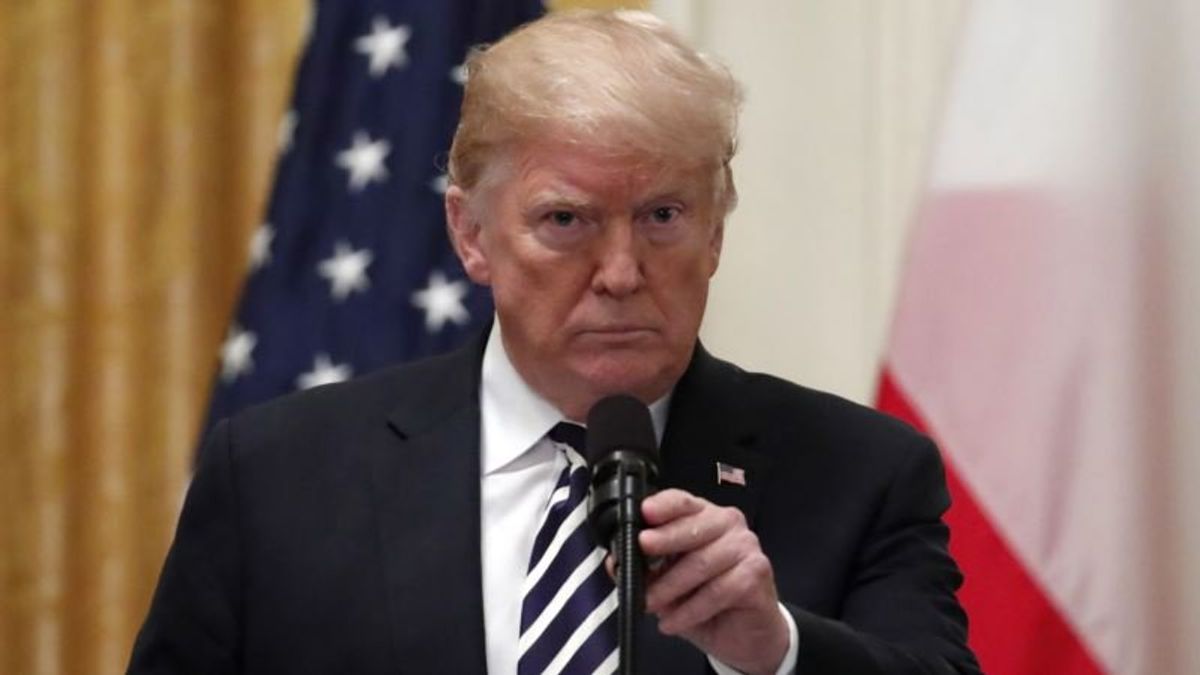
Trump Hints of More Declassifications in Russia Probe
Trump Hints of More Declassifications in Russia Probe

U.S. President Donald Trump is raising the possibility he could order the declassification of more documents related to the investigation into Russia's election meddling.
"We're going to see," Trump told reporters Tuesday while meeting with his Polish counterpart at the White House, repeating his allegation that the investigation itself "is a witch hunt."
"What I want is total transparency," the president said. "The things that have been found over the last couple of weeks about text messages back and forth are a disgrace to our nation."
Trump's comments come less than a day after he responded to calls from his allies in Congress and ordered the declassification of part of a secret surveillance warrant application as well as the text messages of senior Justice Department and FBI officials.
White House Press Secretary Sarah Sanders said the information to be made public includes 21 pages of the 101-page June 2017 FBI surveillance warrant for former Trump campaign adviser Carter Page, which was obtained under the Foreign Intelligence Surveillance Act, or FISA.

It also includes reports of FBI interviews with Bruce Ohr, a high-ranking official at the U.S. Department of Justice, who had been in touch with former British spy Christopher Steele, who authored the controversial dossier on Trump's ties to Russia.
The remainder of the declassified material includes text messages related to the Russian probe written by fired FBI Director James Comey, former deputy FBI chief Andrew McCabe, ex-FBI agent Peter Strzok, and former FBI lawyer Lisa Page.
"Really bad things were happening, but they are now being exposed. Big stuff!" Trump wrote on his Twitter account early Tuesday.
Despite the president's decision to declassify the documents, it is not clear when they will be made public.
Both the Office of the Director of National Intelligence and the Justice Department issued statements late Monday saying they were working to comply with the order but had to review the documents first, "to ensure the safety of America's national security interests."
Trump has consistently said some in the FBI and Justice Department are biased and tainting the independent investigation into whether his campaign collaborated with Russia to swing the 2016 election in his favor.
Trump's supporters in Congress quickly praised the actions.
"Americans deserve the truth about these egregious actions by government officials," Steve Scalise, the No. 3 Republican in the House of Representatives tweeted late Monday.
Another Republican, North Carolina Representative Mark Meadows tweeted, "Transparency wins. This is absolutely the right call."
But California Congressman Adam Schiff, the top Democrat on the House Intelligence Committee, called the move a "clear abuse of power." And New Hampshire Senator Jeanne Shaheen accused the president Tuesday of "trying to undermine an active investigation through reckless declassification."
Former law enforcement and intelligence officials have likewise expressed deep concern, some going as far as to label the president's decision a "serious assault" on the country's justice system.
Others warn the consequences are likely to be far reaching, not because of the information in the declassified documents but because of the sources and methods that may be exposed.
"Foreign sources with information useful for U.S. national security may stop cooperating, or be dissuaded from cooperating in the first place, with U.S. agencies," Paul Pillar, a former senior CIA officer now with Georgetown University, told VOA via email. "If I were a Russian with information useful to the United States, Trump's order would make me more nervous than before about my identity being kept secret, and thus less likely to share what I have with the U.S."
Jeffrey Ringel, the director of The Soufan Group and a 21-year-veteran of the FBI, told VOA that his former colleagues, many of whom side with Trump, say they already feeling the impact.
"They're having a more difficult time working with the public because the public has lost trust in the FBI," Ringel said. "People are less willing to cooperate. They're less willing to provide information.
"President Trump's attacks on the intel community and on the FBI are having a very detrimental effect on the agents and the agents think that that is part of the reason," he said.
VOA's Masood Farivar and Steve Herman contributed to this report.
 US Officials Express Doubts on Future of Nuke Pact with RussiaNext PostTrump Rolls Back Pollution Rules for Drilling on US Lands
US Officials Express Doubts on Future of Nuke Pact with RussiaNext PostTrump Rolls Back Pollution Rules for Drilling on US Lands






